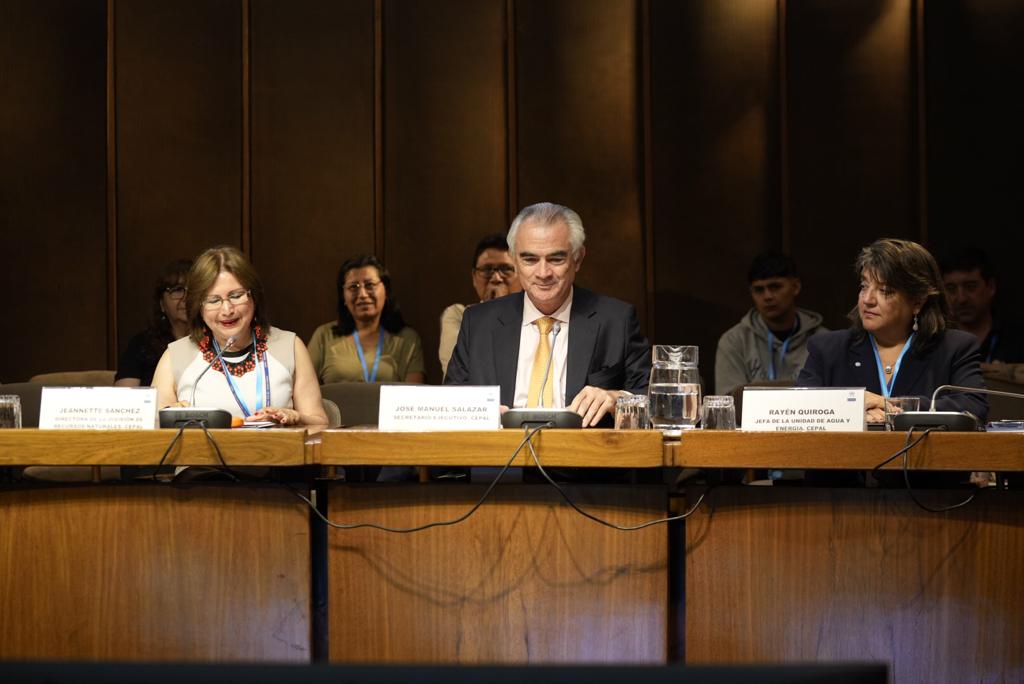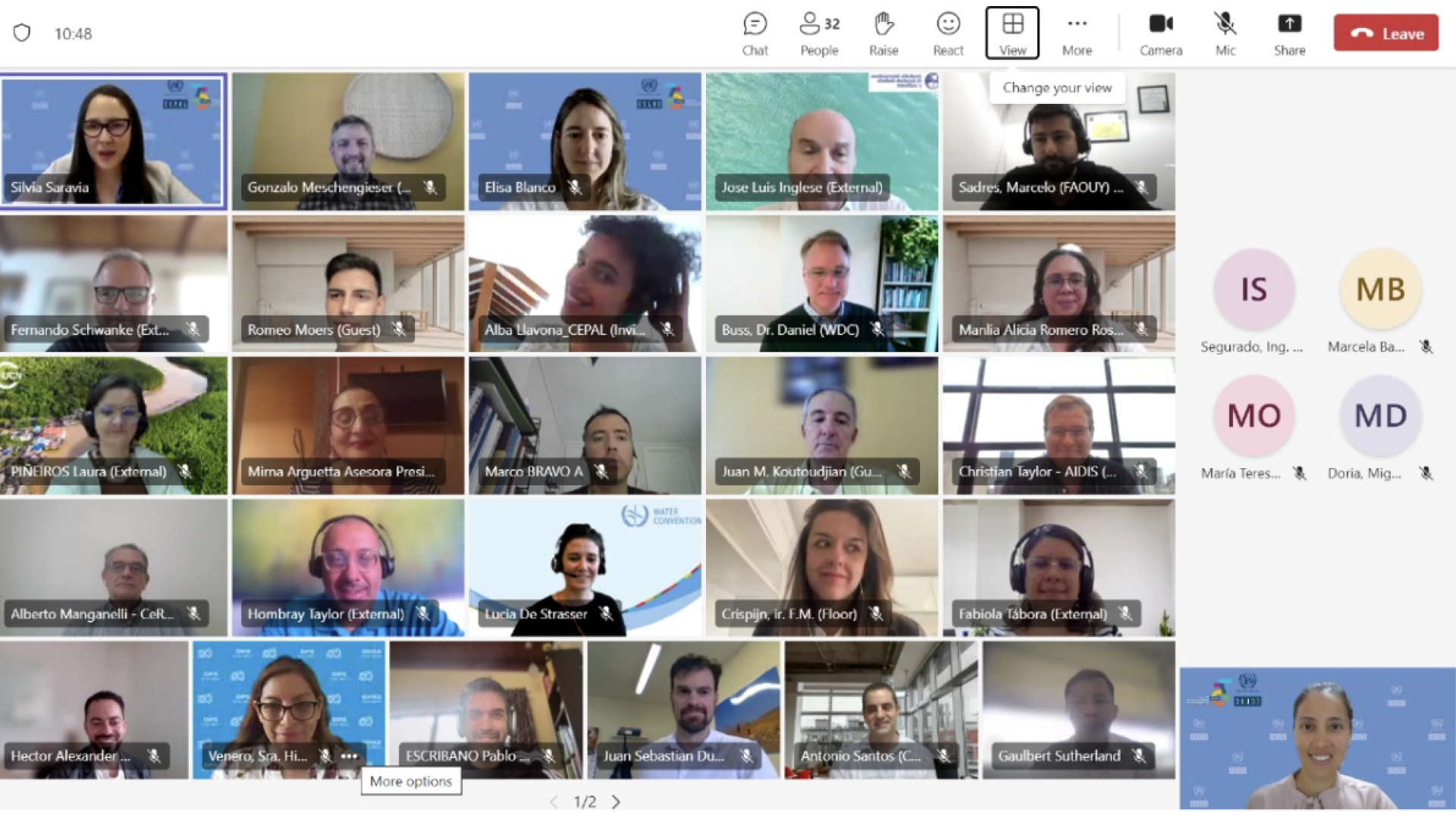Briefing note
Representatives of Latin American and Caribbean countries approved today the Regional Water Action Agenda, which identifies the priority areas and efforts needed to accelerate the achievement of Sustainable Development Goal 6 (to ensure availability and sustainable management of water and sanitation for all) and which will enable the region to arrive at the United Nations 2023 Water Conference, due to take place in March in New York, with one voice.
The Regional Agenda is the main outcome of the third edition of the Regional Water Dialogues 2023, which was organized on February 1-3 by the Economic Commission for Latin America and the Caribbean (ECLAC) along with 10 multilateral organizations, institutions specializing in water and the Government of the Netherlands, and which was held at the Commission’s main headquarters in Santiago, Chile.
More than 20 countries from the region participated in the meeting along with 80 panelists of the highest level from the public and private sectors, international and United Nations organizations, the academic world, non-governmental organizations and civil society. In total, 200 people participated in person and more than 2,000 people did so virtually.
The high-level ministerial event concluded with remarks by José Manuel Salazar-Xirinachs, ECLAC’s Executive Secretary, who highlighted the drafting and approval of the Regional Water Action Agenda, which will serve as a contribution in the framework of the United Nations Water Conference, which he described as the most important event on water in the last 50 years and a historic time to move towards a transition in water management.
“We have more than achieved the goal of this Regional Water Dialogue, by not only analyzing in depth the challenges and progress related to SDG 6, reviewing innovative solutions. In addition, we have achieved commitments to actions and policies for accelerating its fulfillment in Latin America and the Caribbean, moving firmly towards a shared aspiration: a sustainable and inclusive water transition,” the UN regional commission’s highest authority emphasized.
José Manuel Salazar-Xirinachs praised the achievements and innovations that strengthen proper water governance in the region’s countries, to move towards more sustainable management. However, he warned that countries still face numerous challenges: the national water authority must have higher rank and governments need to progressively bolster their institutions, eliminating current gaps and facilitating coordination among them, he explained.
He recalled that in Latin America and the Caribbean, water-related disasters are those that occur the most and have the greatest impact, and he stressed that early warning systems take on vital importance since they reduce the population’s risk of being exposed to the effects of disaster, including flooding. That is why, he said, it is necessary to invest in Integrated Water Resources Management (IWRM) as a solution to better manage these situations and create resilience, especially in the Caribbean’s Small Island Developing States (SIDS).
In that regard, he underlined the importance of having adequate financial resources, above all in countries with bigger shortfalls in infrastructure and coverage.
“We need investment mechanisms that would enable the drinking water and sanitation sector to access new sources of financing, as well as to show examples of the benefits of investing in the circular economy for the sector, also benefiting the population’s health,” he affirmed.
ECLAC’s Executive Secretary emphasized that the region has a major opportunity today: “Investing 1.3% of regional GDP over ten years, to close gaps in coverage in the safely managed drinking water and sanitation sector, would reduce carbon emissions, mitigate pollution problems due to wastewater and create 3.6 million green jobs each year.”
In addition, he celebrated the launch of the Water Sustainability Network and Observatory of Latin America and the Caribbean (ROSA), promoted by ECLAC, and urged for regional and territorial cooperation along with strengthening regional and territorial water cooperation so it can be inclusive, intersectoral and geared towards action.
“We at ECLAC call for action and put our expertise at the disposal of Latin American and Caribbean countries in order to strengthen institutional and technical capacities, improve governance, public policies and water management, all of this in an effort to transform the development model in the region,” he concluded.
The Regional Water Action Agenda aligns with and reinforces several treaties, agreements and strategies around water management and constitutes a call to action for mobilizing all the policy, technical and financial resources available in and for the region of Latin America and the Caribbean.
The Agenda emphasizes that the region needs to move towards a sustainable and inclusive water transition based on four action pillars: i) guaranteeing the human right to safely managed drinking water and sanitation through a big investment push in the sector, leaving no one behind; ii) promoting regulatory changes to facilitate equitable and affordable access, and thereby eradicate water poverty, using innovative instruments including social rates; iii) reverse the growing negative externalities associated with pollution, overexploitation and socio-environmental conflicts by promoting oversight and regulation; and iv) moving from linear to circular management to reduce pressure on water resources, establishing a trend to decouple extraction from Gross Domestic Product (GDP).



